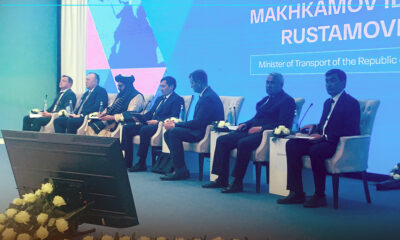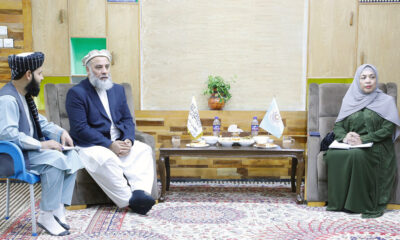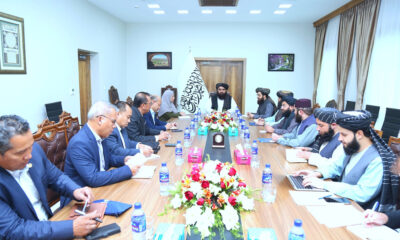Latest News
HPC Outlines New Strategy for Ensuring Peace Talks with Armed Oppositions

 The High Peace Council (HPC) on Thursday said it has outlined a new strategy as part of the peace and reconciliation efforts with the armed oppositions including the Taliban.
The High Peace Council (HPC) on Thursday said it has outlined a new strategy as part of the peace and reconciliation efforts with the armed oppositions including the Taliban.
“The environment is ready, and we Afghans should work together to bring peace in Afghanistan,” said Habiba Sarabi, the Deputy Chairperson of the High Peace Council. “We are very glad to have international community as partner to support us.”
Habiba Sarabi made the remarks at an event titled “Voices for Peace in Afghanistan” which was held in Serena Hotel in Kabul.
Sarabi said that last year, HPC has worked hard to finalize a strategy for bringing justice and sustainable peace in the war-torn country.
“Last year, for six months the High Peace Council have worked very hard to finalize the strategy, the vision for this strategy is to bring sustainable and justice peace in Afghanistan so the Afghans could stay in a secure environment,” she said.
According to Sarabi, the strategic objectives in the new policy, include negotiation through contacting with armed people who are engaged in fighting against the government, national consensus which is one of the major and important object for High Peace Council and monitoring on the political agreements – the High Peace Council will monitor all the political agreements between the government and oppositions as they have been doing with Hezb-e-Islami.
The Deputy Head of HPC said that national consensus could not be done without regional and international consensuses and it is mostly depends on the Afghan government.
Promoting the local initiative such as conflict resolution with the local elders and building the capacity of High Peace Council at the headquarters and local level as well as promoting culture of peace in the country are the other strategic objectives of the new strategy.
“We have to change culture of violence to culture of peace, …from homes , villages and local level,” she said.
Sarabi, meanwhile stressed that they have set up some advisory boards for the High Peace Council including women, youth and religious scholars boards as a move to take the public advisory for peace process.
The official concluded that the High Peace Council had reintegration program which proved unsuccessful therefore, it is not part of their new strategy.
At the event, the EU ambassador in Kabul, Pierre Mayaudon stressed that building national consensus is important for ensuring peace in Afghanistan.
“Building up a national consensus together with regional and international consensuses is undoubtedly one of the priorities of all those who combine the efforts to promote the goals of peace in Afghanistan,” he said.

Latest News
Girls’ education is a ‘vital issue’ for Afghanistan: Karzai

Former president Hamid Karzai said in a meeting with Iran’s ambassador and special representative, Hassan Kazemi Qomi, that education of girls was a “vital issue” for Afghanistan.
Karzai said he appreciated Iran’s cooperation and its standing with the Afghan people, especially Iran’s contributions to education in Afghanistan.
During the meeting, Karzai said peace and stability in the region are in the interest of all regional countries.
Latest News
Uzbekistan’s humanitarian aid arrives in Balkh

A shipment of humanitarian aid from Uzbekistan was handed over on Thursday to the local officials of Balkh province in the trade port of Hairatan.
Local authorities said the aid, which includes flour, oil, wheat, sugar and meat, has been handed over by Uzbekistan’s Surkhandarya governor to the governor of Balkh.
The governor of Surkhandarya stated the purpose of sending this aid was to support the people of Afghanistan and stressed the need for the development of good relations between the two countries.
Latest News
Afghanistan’s problems caused more damage to Pakistan than 3 wars with India: Durrani

Islamabad’s special envoy for Afghanistan Asif Durrani said on Wednesday that Pakistan has suffered more due to Afghanistan’s internal situation than Pakistan has suffered in three wars with India in terms of blood spilt and finances drained.
Durrani said at a one-day International Conference titled “Pakistan in the Emerging Geopolitical Landscape”, which was organized by the Institute of Strategic Studies Islamabad (ISSI) and the German Friedrich Ebert Stiftung (FES), that over 80,000 Pakistanis died in the two decades of the War on Terror and that his country was still counting its dead and injured.
“After the withdrawal of NATO forces, it was hoped that peace in Afghanistan would bring peace to the region. However, such expectations were short-lived,” he said.
He also stated that attacks by the Tehreek-e-Taliban Pakistan (TTP) militant group on Pakistan’s border areas increased by 65 percent, while suicide attacks increased by 500 percent.
“The TTP’s enhanced attacks on Pakistan while using Afghan soil have been a serious concern for Pakistan. Another worrying aspect is the participation of Afghan nationals in these attacks,” he said.
Durrani also said Pakistan had suffered geopolitically since the Soviet Union invaded the neighboring country.
“The post-9/11 world order has negatively impacted Pakistan. Apart from losing 80,000 citizens’ lives, including 8,000 law enforcement agency personnel, the country’s economic opportunity cost is estimated at $150 billion,” Durrani said.
Talking about the future outlook for Pakistan in the regional context, Durrani said that while “our eastern neighbor is likely to continue with its anti-Pakistan pursuits, the western border poses an avoidable irritant in the short to medium term.”
However, he said Pakistan can overcome its difficulties with Afghanistan, including the TTP challenge.
-

 Latest News4 days ago
Latest News4 days agoPakistan’s frontiers minister stresses ‘dignified’ return of Afghan refugees
-

 Regional3 days ago
Regional3 days agoIranian president lands in Pakistan for three-day visit to mend ties
-

 Latest News2 days ago
Latest News2 days agoRashid Khan named AWCC’s brand ambassador
-

 Climate Change4 days ago
Climate Change4 days agoMassive river flooding expected in China, threatening millions
-

 Latest News5 days ago
Latest News5 days agoChinese keen to invest in Panjshir-Kabul water conduit project
-

 World4 days ago
World4 days agoTwo Japan navy helicopters crash, one body found, 7 missing
-

 Sport4 days ago
Sport4 days agoACL: Aino Mina 3-0 Istiqlal Kabul; Attack Energy 3-0 Khadim
-

 Sport3 days ago
Sport3 days agoKolkata beat Bengaluru by one run in IPL as Kohli fumes at dismissal


























